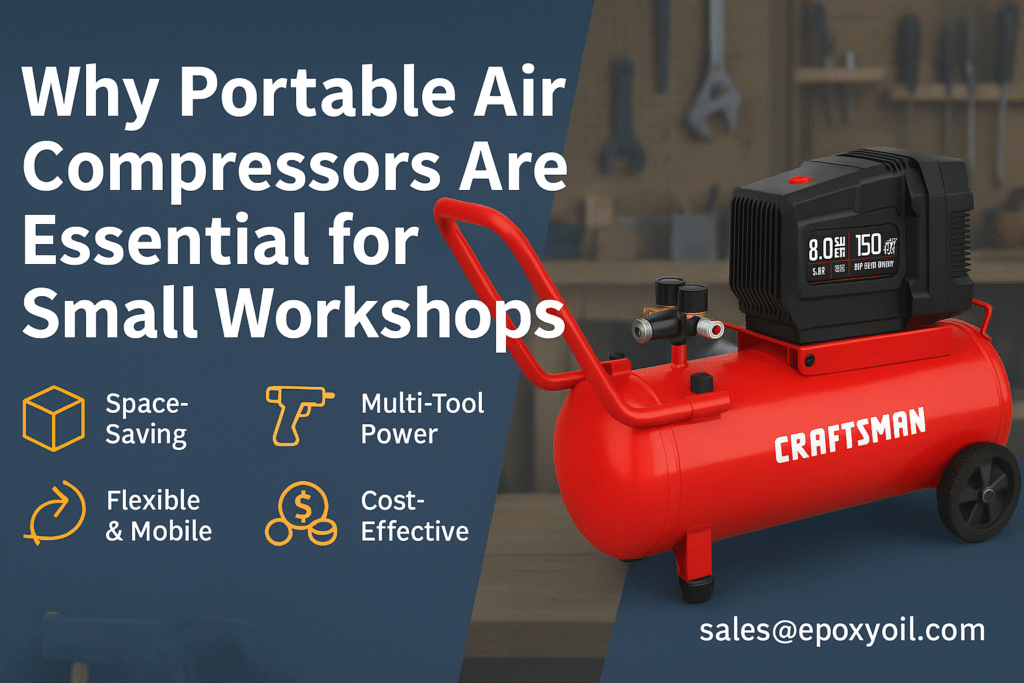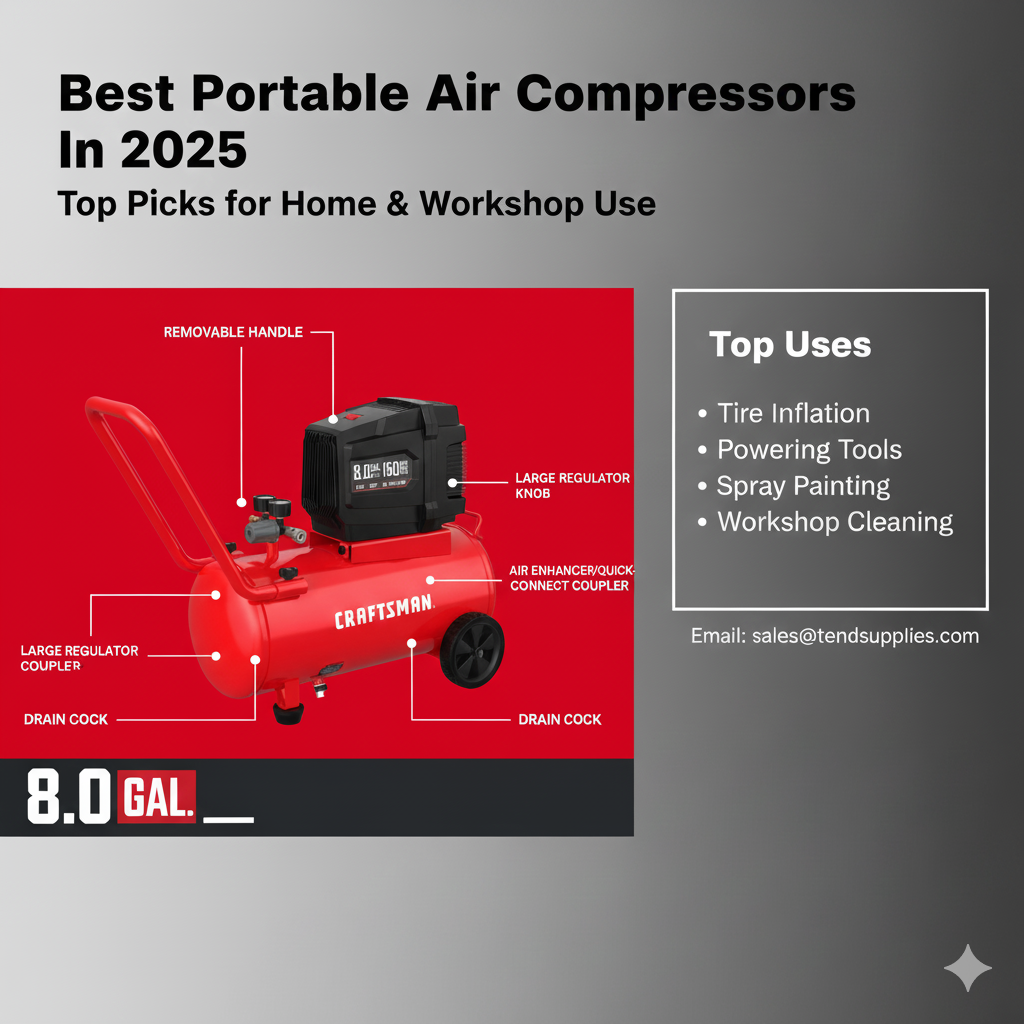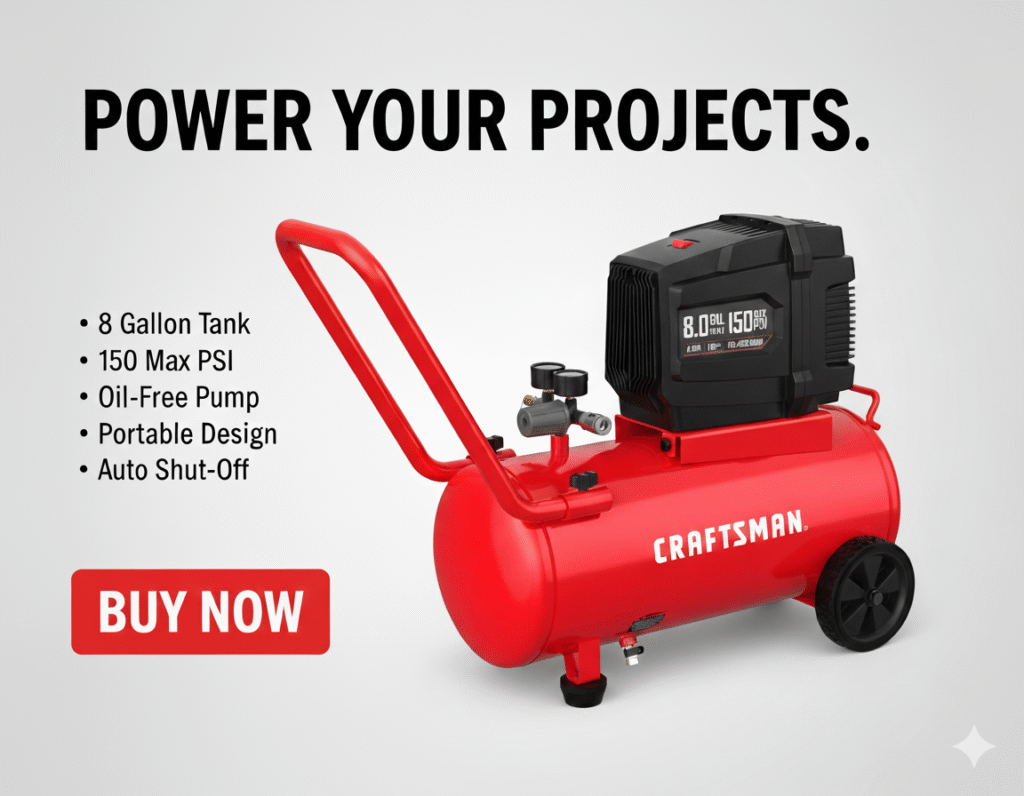Why Portable Air Compressors are Essential for Small Workshops

Introduction
Small workshops thrive on efficiency, flexibility, and smart use of limited space. Whether you’re running a woodworking shop, a car repair garage, or a DIY hobby space, every tool must justify its footprint and cost. This is where portable air compressors stand out.
Unlike bulky stationary units, portable air compressors offer mobility, versatility, and cost savings, making them a vital addition to any compact workspace. They allow small workshops to power a wide range of tools without the need for large, expensive setups.
Key takeaway: A portable air compressor is not just a convenience, it’s a productivity booster that helps small workshops get more done with less.
Understanding Portable Air Compressors
A portable air compressor is designed for mobility and adaptability. Typically smaller in size and lighter in weight, many models come with wheels, handles, or compact builds that allow users to easily move them around the workshop, or even take them to off-site jobs.

Types of Portable Compressors:
Oil-Free Portable Compressors
Lightweight, low-maintenance, and ideal for clean air applications like painting or inflating.
Oil-Lubricated Portable Compressors
Slightly heavier but more durable, suited for heavier workloads.
Battery-Powered Cordless Compressors
Ultra-portable, perfect for remote work or outdoor projects.

Comparison: Portable vs. Stationary
| Feature | Portable Compressor | Stationary Compressor |
| Size & Weight | Compact, easy to move | Large, fixed in place |
| Cost | Affordable upfront | Higher investment |
| Use Case | Small workshops, DIY, job sites | Industrial-scale production |
| Flexibility | High mobility | Limited to one space |
Benefits of Portable Air Compressors in Small Workshops
Space-Saving Design
Small workshops often struggle with space. A portable air compressor provides the power you need without dominating your floor area. Its compact size means it can be easily tucked away in a corner or stored when not in use, freeing up valuable workspace.
Cost-Effective Power Source
Investing in multiple dedicated tools can quickly become expensive. A portable air compressor reduces costs by powering a wide range of pneumatic tools such as nail guns, spray painters, impact wrenches, and inflators. Instead of buying separate machines, you get a single power source that serves multiple purposes.
Flexibility & Mobility
In a small workshop, layout changes are common. You might shift workbenches, tools, or even move projects outdoors. A portable compressor follows you wherever you go. With wheels or handles, it’s easy to roll across the shop floor or load into a vehicle for on-site jobs. This level of mobility makes it indispensable for small business owners and DIY enthusiasts alike.
Versatility of Applications
One of the strongest reasons to invest in a portable air compressor is its multi-purpose capability. From woodworking to automotive repair, these units can power:
- Nail guns & staplers for precise woodworking.
- Spray guns for painting or finishing surfaces.
- Impact wrenches & ratchets for tightening bolts in auto garages.
- Grinders & sanders for metalwork.
- Tire and ball inflators for everyday shop and household tasks.
Instead of purchasing several specialized machines, workshop owners gain a single solution that adapts to nearly any project.
Easy Maintenance
Compared to large stationary compressors, portable units are designed with simplicity in mind.
- Oil-free models need virtually no lubrication upkeep.
- Even oil-lubricated portable models require far less frequent servicing than industrial systems.
This ease of care means small workshop owners spend more time working and less time maintaining their tools.
Key Features to Look for in a Portable Air Compressor
When shopping for a portable compressor for your workshop, keep these factors in mind:
Tank Size & PSI Rating
- A small 6–8 gallon tank is fine for light projects like brad nailing or inflating.
- For more demanding tasks (spray painting or powering impact wrenches), consider 20 gallons or above.
- Always check the PSI rating to ensure compatibility with your tools.
Noise Level
Small workshops often double as garages or home-based spaces, making noise a major concern.
- Look for compressors marketed as “quiet” or “low-decibel”.
- Oil-lubricated compressors generally run quieter than oil-free ones.
Power Source
- Electric-powered models are most common, ideal for consistent workshop use.
- Battery-powered compressors provide maximum portability for outdoor or on-site tasks.
Durability & Build Quality
Choose compressors made from steel tanks and reinforced components to withstand regular use. Pay attention to warranty coverage, which reflects the manufacturer’s confidence in the product.
Portability Features
Handles, compact design, and wheels make moving the unit effortless. For very small shops, this mobility prevents clutter and improves workflow.
Choosing the Right Compressor for Your Workshop
Different workshops have different needs. Here’s a breakdown to guide your choice:
- Woodworking Shops:
A small oil-free compressor is ideal for nail guns, staplers, and spray guns used for finishes. - Automotive Garages:
Opt for a larger, oil-lubricated portable compressor that can handle impact wrenches, ratchets, and spray painting. - DIY Hobby Spaces
Lightweight, oil-free models are perfect for inflating, occasional painting, or powering small tools without fuss.
By aligning your tool requirements, usage frequency, and available space, you can select a portable compressor that enhances your productivity without overwhelming your shop.
Frequently Asked Questions (FAQs)
Can a portable compressor run the same tools as a stationary one?
Yes, but with limits. Portable compressors can handle most common pneumatic tools, though very heavy-duty or continuous industrial tasks are better suited for stationary models.
How long do portable air compressors last?
With proper use and maintenance, a quality portable compressor can last 5–10 years, depending on workload and build quality.
Are oil-free portable compressors better for small workshops?
Yes, especially for DIYers and light-use environments. They’re lighter, cleaner, and require less upkeep, but oil-lubricated models last longer for heavy use.
What tank size is ideal for small workshops?
Anywhere from 6 to 20 gallons works, depending on the tools you run. Larger tanks allow for longer continuous use without refilling.
Can portable compressors handle continuous heavy-duty tasks?
Not recommended. For continuous or industrial workloads, a stationary, oil-lubricated compressor is the better choice. Portable units excel in short to medium-duty tasks.
Related Article
Best Portable Air Compressors in 2025: Top Picks for Home and Workshop Use
Oil-Free vs Oil-Lubricated Compressors: Which Should You Buy?
Conclusion
For small workshops, where space, cost, and efficiency are constant concerns, portable air compressors are more than just a handy tool, they are essential equipment. Their compact size saves valuable floor space, their mobility ensures flexibility, and their ability to power multiple tools makes them a smart, cost-effective investment.
Whether you’re a DIY hobbyist, carpenter, mechanic, or small business owner, a portable compressor adapts to your needs, helping you work faster, cleaner, and smarter.At Epoxy Oilserv Nigeria Ltd, we offer a wide selection of portable air compressors designed to meet the unique needs of small workshops across Nigeria. Contact us today at sales@epoxyoil.com for expert advice and nationwide delivery.

